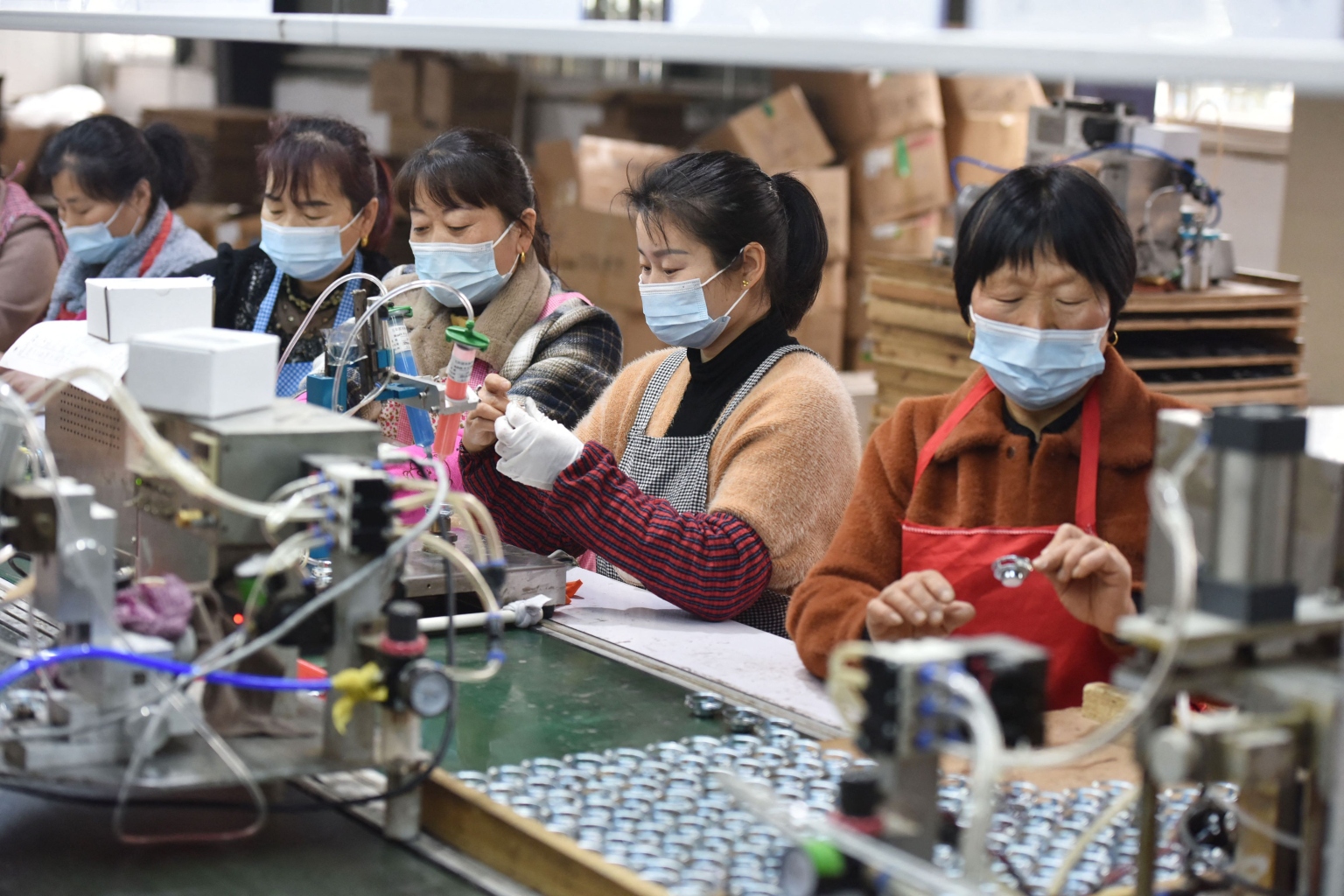China's economy contracts sharply as lockdowns wreak havoc
Sign up now: Get ST's newsletters delivered to your inbox

An assembly line producing speakers at a factory in Linquan county, Anhui province, China, on March 31, 2022.
PHOTO: AFP
BEIJING (REUTERS, BLOOMBERG) - China's economic activity cooled sharply in April as widening Covid-19 lockdowns took a heavy toll on consumption, industrial production and employment, adding to fears that the economy could shrink in the second quarter.
Full or partial lockdowns were imposed in dozens of cities in March and April, including a protracted shutdown in commercial centre Shanghai, keeping workers and shoppers confined to their homes and severely disrupting supply chains.
Retail sales in April shrank 11.1 per cent from a year earlier, the biggest contraction since March 2020, data from the National Bureau of Statistics (NBS) showed on Monday (May 16), and worse than forecast.
China's auto sales plunged 47.6 per cent from a year earlier as carmakers slashed production amid empty showrooms and parts shortages.
As the anti-virus measures snarled supply chains and paralysed distribution, industrial production fell 2.9 per cent from a year earlier, below expectations for 0.4 per cent growth. The reading was the largest decline since February 2020.
The shock also weighed on the job market, which Chinese leaders have prioritised for economic and social stability. The nationwide survey-based jobless rate rose to 6.1 per cent in April from 5.8 per cent, the highest since February 2020 when it stood at 6.2 per cent.
The 6.7 per cent jobless rate in 31 major cities in April is the highest since records started in 2018. The government aims to keep the jobless rate below 5.5 per cent in 2022.
China wants to create more than 11 million jobs and preferably 13 million urban jobs this year, Premier Li Keqiang said in March, but he recently called the employment situation "complicated and grim" following the worst Covid-19 outbreaks since 2020.
Property sales by value slumped 46.6 per cent in April from a year earlier, the fastest pace since at least 2010, and sharply widening from the 26.17 per cent fall in March, according to Reuters calculations based on NBS data released on Monday.
Fixed asset investment, a main driver that Beijing is counting on to prop up the economy as exports lost momentum, increased 6.8 per cent year on year in the first four months, compared with an expected 7 per cent rise.
Analysts say Beijing's official 2022 growth target of around 5.5 per cent is looking harder and harder to achieve as officials maintain draconian zero-Covid-19 policies. Moreover, the key property market is in a protracted slump and export growth has slowed to a two-year low.
The economy grew 4.8 per cent in the first quarter.
ING analysts are looking for a 1 per cent contraction in economic growth in the second quarter from a year earlier, while Nomura said the Chinese economy has been facing a rising risk of recession since mid-March.
Capital Economics is now forecasting full-year Chinese growth of just 2 per cent and says if Covid-19 cannot be controlled, even that is not guaranteed.
"Even once the current virus wave is quashed, Covid-19 controls will continue to hold back activity to some degree over the coming quarters," it said in a note on Friday.
While policymakers have repeatedly pledged more support for the slowing economy, stimulus so far has been "underwhelming", with only small policy rate cuts, it added.
China's central bank took steps on Sunday to ease housing crunch by reducing mortgage rates for first-time homebuyers. However, it left the interest rate on one-year policy loans unchanged on Monday, as inflation pressure and worries about capital outflows reduce the scope for more easing.
Banks could cut their main lending rates on Friday this week, which would help to further lower mortgage rates for homebuyers after the cut announced by the central bank over the weekend. However, economists see the impact as fairly limited for now.
Monetary stimulus is proving less effective in the face of virus lockdowns, with data on Friday showing businesses and consumers had little appetite to borrow in April. Credit growth weakened sharply last month, with new renminbi loans sinking to the lowest level since December 2017.
"The biggest problem... is the continued current pressure on credit, and to the extent that business confidence is being shaken, and credit demand is now fundamentally being damaged," said Ms Helen Qiao, economist for Greater China at Bank of America. "And therefore it takes more than just a simple interest rate cut to boost the credit demand."


